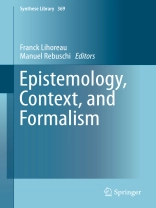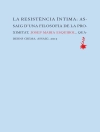The main purpose of the present volume is to advance our understanding of the notions of knowledge and context, the connections between them and the ways in which they can be modeled, in particular formalized – a question of prime importance and utmost relevance to such diverse disciplines as philosophy, linguistics, computer science and artificial intelligence and cognitive science.
Bringing together essays written by world-leading experts and emerging researchers in epistemology, logic, philosophy of language, linguistics and theoretical computer science, the book examines the formal modeling of knowledge and the knowledge-context link at one or more of three intersections – context and epistemology, epistemology and formalism, formalism and context – and presents a novel range of approaches to the current discussions that the connections between knowledge, language, action, reasoning and context continually enlivens. It develops powerful ideas that will push the relevant fields forward and give a sense of the new directions in which mainstream and formal research on knowledge and context is heading.
Tabela de Conteúdo
Introduction; Franck Lihoreau and Manuel Rebuschi.- Chapter 1. Context as Assumptions; Erich Rast.- Chapter 2. Knowledge and Disagreement; Martin Montminy.- Chapter 3. A Contradiction for Contextualism?; Peter Baumann.- Chapter 4. Epistemic Contexts and Indexicality; Yves Bouchard.- Chapter 5. Knowing Who: How Perspectives and Context Interact; Maria Aloni and Bruno Jacinto.- Chapter 6. Knowledge Attributions in Context of Decision Problems; Robert van Rooij.- Chapter 7. How Context Dependent is Scientific Knowledge?; Sven Ove Hansson.- Chapter 8. Action, Failure and Free Will Choice in Epistemic stit Logic; Jan Broersen and John-Jules Charles Meyer.- Chapter 9. Belief, Intention and Practicality: Loosening Up Agents and Their Propositional Attitudes; Richmond H. Thomason.- Chapter 10. Character Matching and the Locke Pocket of Belief; Gregory Wheeler.- Chapter 11. A modal logic of perceptual belief; Andreas Herzig and Emiliano Lorini.- Chapter 12. Hyperintensionality and De Re Beliefs A Counterpart-Theoretic Account; Paul Égré.- Chapter 13. Knowledge Is Justifiable True Information; Jaakko Hintikka.












